 |
 |
 |
Dow: Life Poisoned Daily. |

|
| In the News...
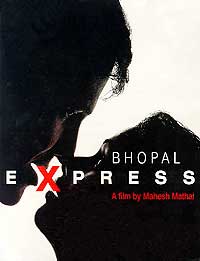
 download the poster download the poster
Greenpeace cordially invites you to attend a
screening of the feature film, Bhopal Express at Visions
Theatre in Washington, D.C.
Bhopal Express is a human drama set against the gas
tragedy in Bhopal, India. This moving film tells the
story of the world's worst industrial disaster through
the eyes of a newlywed couple and examines the
irresponsible practices of large corporations and the
effects of their actions on common people.
When : January 14th, 2003
Cost : $7.50
Time :
7pm
Where: Visions Theatre, 1927 Florida Ave NW,
Washington DC
Since 1984 at least 20,000 people have died and
thousands continue to suffer from exposure-related
diseases. Greenpeace is working with the local survivors
to pressure Dow Chemical, now owner of Union Carbide, to
accept its pending liabilities in Bhopal, clean up the
site, provide people with clean drinking water,long-term
medical care and full compensation.
This event is sponsored by Greenpeace, DC Indymedia
and the Association for India's Development.
Greenpeace, Bhopal Survivors Return Toxic Waste To
Dow Chemical
Read the press release
 View
video from the action View
video from the action
Dow fights for its image, but not the victims in
Bhopal
See story
Read story in the New York Times
Activists Confront Dow CEO Michael Parker at His Home
in Midland, Michigan
Press Release
 View Video
View Video
You will need RealPlayer to view the video. Download free from
Real.com
Investors Urge Dow Chemical To Take Responsibility
For Bhopal Disaster (Dec 4)
Press Release
Digvijay Singh Apologises For Police Brutality, Drops
All Charges Against Activists (Dec. 3)
Press Release
 Read
Greenpeace's letter to the Ambassdor of India Read
Greenpeace's letter to the Ambassdor of India
Press Release
View
Video
Bhopal Activists Confront Dow Chemical CEO
Michael Parker
(23 October
2002)
Greenpeace Gets Corporate Criminal Warren
Anderson on Tape at Long Island Home
(29 August 2002)
Greenpeace Welcomes Indian Court Ruling on
U.S. Corporate Criminal, Warren Anderson
(28 August 2002)
U.S.
woman scales a 90 foot tower at Dow Chemical's Seadrift
plant.
| | The
Dow Chemical Company, with annual sales exceeding $30 billion U.S.,
is the largest chemical manufacturing company in the world. Despite
being one of the richest companies on the planet, Dow has done
little to be a good steward of the environment. Dow's environmental
track record includes the original manufacturing and distribution of
now highly restricted or banned (in the United States) chemicals
such as DDT, Agent Orange, Dursban (pesticide) and asbestos.
Dow's ascension to the top of the worldwide list of chemical
producers comes partially as a result of their recent purchase of
Union Carbide, whose merger with Dow was completed on February 6,
2001. In acquiring Union Carbide's assets, Dow also assumed
responsibility for Union Carbide's liabilities. These liabilities
include Union Carbide's negligent role in the worst chemical spill
in history.
The
Disaster in Bhopal
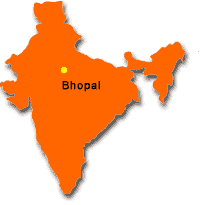 On the
night of December 2nd, 1984, over 40 tons of lethal methyl isocyante
(MIC) gas spilled out from Union Carbide's pesticide factory in
Bhopal, India. With safety systems either malfunctioning or turned
off, an area of 40 square kilometers, with a resident population of
over half a million, was soon covered with a dense cloud of MIC gas.
People woke in their homes to fits of coughing, their lungs filling
with fluid. In the span of the first three days after the accident,
over 8,000 people died in Bhopal, mainly from cardiac and
respiratory arrest. On the
night of December 2nd, 1984, over 40 tons of lethal methyl isocyante
(MIC) gas spilled out from Union Carbide's pesticide factory in
Bhopal, India. With safety systems either malfunctioning or turned
off, an area of 40 square kilometers, with a resident population of
over half a million, was soon covered with a dense cloud of MIC gas.
People woke in their homes to fits of coughing, their lungs filling
with fluid. In the span of the first three days after the accident,
over 8,000 people died in Bhopal, mainly from cardiac and
respiratory arrest.
Since the disaster, over 20,000 people have died from
exposure-related illnesses, and of the approximately 520,000 people
exposed to the poisonous gases, an estimated 120,000 remain
chronically ill.
Justice
in Bhopal
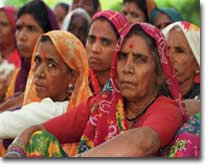 Justice has eluded the people of Bhopal for over 17 years. Union
Carbide negotiated a settlement with the Indian Government in 1989
for $470 million US, a total of $370 to $533 per victim, a paltry
sum that is too small to pay for most medical bills. In 1987, a
Bhopal District Court charged Union Carbide officials, including
then CEO Warren Anderson, with culpable homicide, grievous assault
and other serious offences. In 1992, a warrant was issued for
Anderson's arrest.
Justice has eluded the people of Bhopal for over 17 years. Union
Carbide negotiated a settlement with the Indian Government in 1989
for $470 million US, a total of $370 to $533 per victim, a paltry
sum that is too small to pay for most medical bills. In 1987, a
Bhopal District Court charged Union Carbide officials, including
then CEO Warren Anderson, with culpable homicide, grievous assault
and other serious offences. In 1992, a warrant was issued for
Anderson's arrest.
Dow, since its merger with Union Carbide, has refused to assume
these liabilities in India, despite the fact that over 20,000 people
in vicinity of the Union Carbide factory continue to be exposed to
toxic chemicals through groundwater and soil contamination. This
stands in stark contrast to Dow's acceptance of Union Carbide's
liabilities in Texas, where they recently settled an
asbestos-related lawsuit.
Images
from Bhopal
Nothing tells the story of Bhopal more
clearly than images of the people who live there. This photo exhibit
by Raghu Rai, commissioned by Greenpeace, gives insight into the
devastation wrought on the people of Bhopal.
"What I saw was to change my life," said Rai. "It was an
unprecedented scene of chaos. What startled me most was the silence
of death. Thousands of people had already died; thousands more than
died in the 11 September attack on the World Trade Centre. I vowed
then and there to continue my work, to do all I could to show the
world what happens to people when corporations are not held liable
for their operations, when they are allowed to cut costs and safety
standards when they operate abroad."
Warning: Some of these images may not be suitable for
children. Viewer discretion is advised.
Greenpeace and
Coalition of Survivor Groups in Bhopal Demand that Dow
Chemical:
assume liability for the continuing and long-term health impacts
of the disaster, including release of unpublished medical reports on
the toxicity of leaked gases
assume liability for the loss of livelihood caused as a result
of the disaster by providing income opportunities to victims and
support to those rendered destitute
remove the contamination of the ground water and soil in and
around the factory
ensure that prime accused Warren Anderson, former chairman of
Union Carbide, is brought to justice in the Bhopal criminal court,
along with authorized representatives of the company
Greenpeace is part of a coalition, AaCcTt:Bhopal, that is
composed of the Bhopal-based organizations Bhopal Gas Affected Women
Stationary Workers Association, Bhopal Gas Affected Pensioners
Association, and Bhopal Group for Information and Action and their
allies: Bhopal Action Resource Center, CorpWatch, National Campaign
for Justice in Bhopal and The Other Media. The campaign is also
supported by the Ecology Center of Michigan, Environmental Health
Fund, Environmental Health Watch, Pesticide Action Network,
Essential Action and the Center for Health, Environment and
Justice.
Bhopal Survivors Bring Their
Demands to Dow CEO at Annual Shareholders Meeting
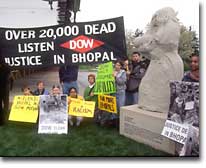
May 9th demonstration at Dow's
annual shareholders meeting.
(c) 2002 Jim West/Greenpeace
| A delegation of survivors of the
Bhopal chemical disaster held a press conference before Dow
Chemical's annual shareholders meeting on May 9th. The survivors
joined Midland residents to urge the company to address the
environmental and health problems that still afflicts the Indian
community and to seek a commitment that the company will work to
prevent future disasters at all Dow facilities.
Find out more from the press release, Survivors of Bhopal Deadly Chemical Disaster Overshadow
Dow Annual Meeting
The Bhopal Delegation included:
Dr. H. H. Trivedi, former Professor of Internal Medicine at the
Gandhi Medical College in Bhopal, was the only senior doctor
attending to patients at the Hamidia Hospital on the night of the
disaster. He continues providing care to ailing survivors to this
day with special emphasis on pulmonary diseases. He is one of the
trustees of the Sambhavna Trust.
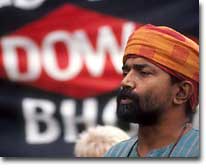 (c) 2002 Jim West/Greenpeace
(c) 2002 Jim West/Greenpeace
| Mr. Satinath Sarangi, an
administrator at the Sambhavna Clinic and Research Center. Mr.
Sarangi has been involved in supporting the Bhopal activists since
the day of the disaster in 1984. He is the administrator of the only
clinic in Bhopal specifically designed to address the long-term
health impacts of the Bhopal survivors. The Sambhavna Clinic offers
a unique combination of Allopathic, Ayurvedic and yoga treatments to
patients. Mr. Sarangi was a member of the first Bhopal delegation to
come to the United States in 1989, where he attended the Union
Carbide shareholders meeting.
Greenpeace Demonstrations
Support Bhopal Survivors
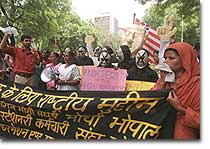
Delhi, India, July 10th, 2002
©
2002 Greenpeace/Raghu Rai |
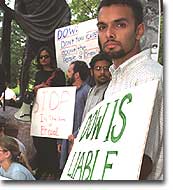
Washington DC, July 10th,
2002
© 2002 Greenpeace/Laura Lombardi
| The Washington Post reports July
7th: India Seeks to Reduce Charge Facing Ex-Union Carbide
Boss
Greenpeace joins survivors of the Bhopal gas
disaster to protest moves by the Indian government to reduce
homicide charges against Warren Anderson, former Union Carbide CEO,
to negligence. Anderson has been accused of crimes in Bhopal but has
been in hiding in the United States ever since. Find out more.
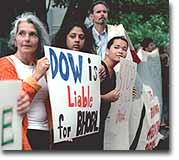
Washington DC, June 12th,
2002
© 2002 Greenpeace/Lindsay Reynolds
| On June 12th, 2002, Greenpeace and
coalition members met outside an awards ceremony in Washington DC,
where Dow was awarded a National Medal of Technology Award. The
demonstrators called on Dow to clean the abandoned factory site,
provide long term medical and economic assistance to survivors, and
face criminal liability charges as owners of Union Carbide, the
company responsible for the deadly gas leak. Find out more.
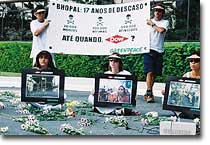
Brazil, May 8th, 2002
© 2002
Greenpeace/Rodrigo Petterson | Over
20 Greenpeace activists and members of ACPO, a Brazilian association
against POPs (Persistent Organic Pollutants) and fishermen from
UNIPESQ, the Union of the Fishers of Conceicaozinha, in Guaruja,
Brazil, staged a ceremony dedicated to the thousands of victims in
Bhopal. The ceremony took place in front of the Dow Chemical
headquarters, in Sao Paulo. The entrance of the building was covered
by flowers, symbolizing the victims of the accident. A banner was
hung showing the number of victims of Bhopal's accident and a
message asking, "Until when, Dow?"
Take Action
Online
Send an email and fax and tell Dow's new CEO to Stop
Mad Dow's disease
Learn More
 Chemical Stockpiles In Bhopal Chemical Stockpiles In Bhopal
 Read Greenpeace's August 16 letter to the State
Department. Read Greenpeace's August 16 letter to the State
Department.
At the June 2002 World Summit on Sustainable
Development in Bali, Greenpeace unveiled Bhopal
Principles, a sustainable international policy alternative to
curb rampant corporate irresponsibility.
 Corporate Crimes: The need for an international
instrument on corporate accountability and liability (2002
report) (682 KB) Corporate Crimes: The need for an international
instrument on corporate accountability and liability (2002
report) (682 KB)
 Dow:
Life Poisoned Daily (factsheet) Dow:
Life Poisoned Daily (factsheet)
 Bhopal:
Continuing the Fight for Health and Justice (factsheet) Bhopal:
Continuing the Fight for Health and Justice (factsheet)
 The
Bhopal Legacy (report) The
Bhopal Legacy (report)
 Dow
Chemical, Preliminary Bibliography (Pesticide Action Network
North America, 2002) Dow
Chemical, Preliminary Bibliography (Pesticide Action Network
North America, 2002)
Dow Brand Dioxin (report)
 Dow: Myths and Realities (the truth behind Union
Carbide's website on the Bhopal accident) Dow: Myths and Realities (the truth behind Union
Carbide's website on the Bhopal accident)
Links
Greenpeace Correspondence with Dow:
 letter to
Dow (May 6, 2002) letter to
Dow (May 6, 2002)
 letter
from Dow (May 2, 2002) letter
from Dow (May 2, 2002)
 letter
to Dow (April 15, 2002) letter
to Dow (April 15, 2002)
 letter
from Dow (March 1, 2002) letter
from Dow (March 1, 2002)
 letter
to Dow (February 19, 2002) letter
to Dow (February 19, 2002)
 letter to
Dow (December 3, 2001) letter to
Dow (December 3, 2001)
 letter to
Dow (March 20, 2001) letter to
Dow (March 20, 2001)
Greenpeace
holds protests against Dow around the world. (December 3, 2001)

|
 |
 |